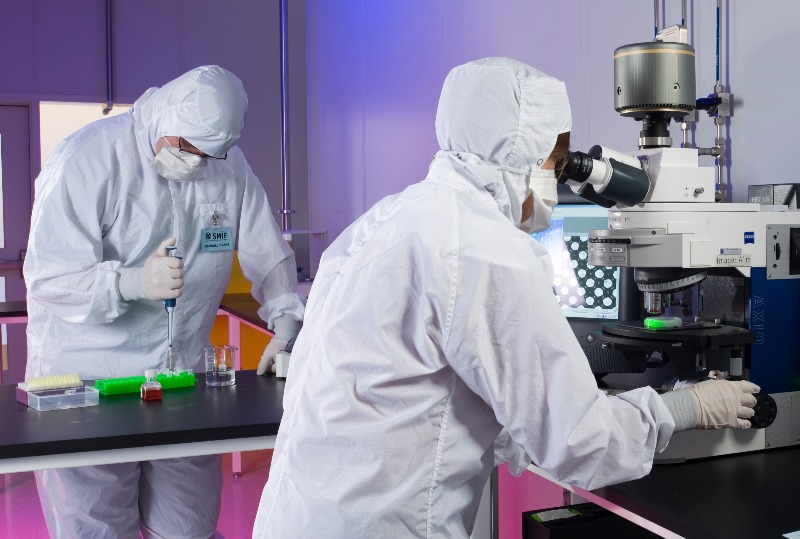
Johann Guilleminot, Ph.D.
johann.guilleminot@duke.eduPaul Ruffin Scarborough Associate Professor of Engineering

If humanity is to harvest solar energy economically, make quantum computing practical and solve other grand challenges, it must develop new materials.
Students who pursue this sequence of seven courses will learn the principles of the structure and application of novel materials.
Upper-level undergraduate students in Duke’s Pratt School of Engineering and Trinity College of Arts & Sciences are eligible.
The Duke Materials Initiative convenes a world-class community, connecting innovation in engineering, the sciences and medicine.
Complete seven (7) courses—including a Centerpiece Course, Electives and a complementary course in the Humanities & Social Sciences.
Click to see lists of courses approved for this undergraduate certificate program.
| Title | Instructor(s) | Offered |
|---|---|---|
| ME 221 Structure & Properties of Solids
Alternatives for majors other than Mechanical Engineering:
|
Blum, Chi, Delaire, Ni, Zauscher
|
Fall & Spring
|
|
ME 412 Modern Materials
|
Payne
|
Not currently offered
|
|
ME 490 AI for Materials
|
Guilleminot
|
Fall
|
|
ME 490 Statistical Thermo Matter
|
Delaire
|
Spring
|
| Course | Instructor(s) | Offered | Note |
|---|---|---|---|
| ME 321 Mechanical Engineering Analysis for Design | Santillan | Spring | Required for ME majors |
| ME 490 Molecular Modeling of Soft Matter | Arya | Fall | Starting Fall 2026 |
| ME 491 Independent Project | Must be materials-related. Requires a detailed plan and prior approval. | ||
| ME 510 Diffraction & Spectrometry of Materials | Delaire | Fall | Occasionally |
| ME 511 Computational Materials Science | Blum | Spring | |
| ME 514 Properties & Characterization of Polymeric Materials | Zauscher | Fall | |
| ME 516 Thin-Film Photovoltaic Technology | Mitzi | Spring | Occasionally |
| ME 555 Electron Microscopy for Energy & Sustainability | Chi | Spring | |
| ME 555 Fundamentals of Soft Matter | Rubinstein Zauscher |
Spring | |
| ME 555 Intermediate Polymer Physics | Rubinstein | Fall & Spring | Cross-listed as CHEM 590 Introduction to Polymer Physics |
| ME 555 Introduction to Rheology | Keshavarz | Fall | |
| ME 582 Applications in Data & Materials Science | Brinson | Spring | |
| BME 302 Fundamentals of Biomaterials & Biomechanics | Spring | ||
| CEE 302 Introduction to Soil Mechanics | Spring | ||
| CEE 422 Concrete & Composite Structures | Spring | ||
| CEE 423 Metallic Structures | Fall | ||
| CHEM 210 Modern Applications of Chemical Principles | Fall & Spring | ||
| CHEM 301 Elements of Physical Chemistry | Fall | ||
| CHEM 310 Physical Chemistry I | Fall | ||
| ECE 230 Microelectronic Devices & Circuits | Fall & Spring | ||
| ECE 511 Foundations of Nanoscale Science & Technology | Spring | ||
| ECE 521 Quantum Mechanics | Fall | Occasionally | |
| ECE 524 Introduction to Solid-State Physics | Fall | ||
| ECE 545 Foundations of Nanoelectronics & Nanophotonics | Spring | ||
| EGR 201 Mechanics of Solids | CEE Staff | Fall & Spring | Required for ME, CEE and BME majors |
| PHYS 264 Optics & Modern Physics | Fall & Spring | ||
| PHYS 363 Thermal Physics | Spring |
| Course | Offered |
|---|---|
| HISTORY 106 Science & the Modern World | Spring |
| ECON 112FS Globalization & Corporate Citizenship | Fall |

Duke undergraduates can gain research experiences in Duke’s Shared Materials Instrumentation Facility — a state-of-the-science suite of laboratories that include class 100 and class 1000 clean rooms, electron microscopy, MicroCT imaging, X-ray characterization and optical spectroscopy.

Paul Ruffin Scarborough Associate Professor of Engineering